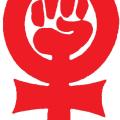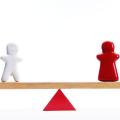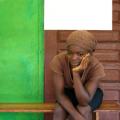Archive
2011

Young men pressured from all sides
A recent Norwegian report looks at young men from highly patriarchal immigrant families who are struggling with their lives and who have a rather complicated relationship to women.

Safeguarding against complex discrimination
When a black lesbian is passed by at the workplace, is that a case of discrimination against women? Of gay people? Or because of her race? Or a stereotype that the three elements create in combination? Norwegian researchers Mari Teigen and Liza Reisel are looking into whether legislation can tackle compound discrimination of this sort.

Greedy private life?
Malaysian IT employees are required to work until 5:30 pm every day, while their Norwegian colleagues often work a flexi-time schedule. So why is it the Norwegians who complain about a time crunch?

The forgotten philosophers
Why is killing one’s enemies regarded as more important than raising children? This question was posed by the philosopher “Sophia” as early as the 1700s. “Feminist philosophy didn’t emerge in the 1960s. Questions like these have a long-standing tradition in the field,” says philosopher Tove Pettersen of the University of Oslo.

Old farms, new men
When traditional Norwegian farming is converted to nature-based agritourism, the gender roles on the farm change. Often the women become the general managers, while the men take over in the kitchen.

Practice of female circumcision changes in exile
According to a new book by Professor Aud Talle, most Somalis who live in Norway have changed their attitude towards female circumcision and are now against the practice.

New tools needed
Despite the increasing awareness about multidimensional discrimination, neither the legislators nor the monitoring agencies are sufficiently well equipped to handle this problem, according to professor of political science Hege Skjeie.

Lack of cooperation between minority and majority women NGOs
Civil society organizations for ethnic Norwegian women and minority women cooperate very little with each other. This is one of the findings from Cecilie Thun’s ongoing doctoral research project.

Underpaid domestic workers
Domestic workers are not covered by collective agreements and regulations that pertain to Norwegian working life. As a result, they find themselves in an especially vulnerable situation – partly because many of them work under conditions that protect the employer, not the worker. Could establishing a minimum price be a solution?
2010

Happy despite work-family conflict
Notwithstanding the welfare state, employed mothers in Scandinavia experience just as much conflict between work and family life as mothers in Southern Europe, but the Scandinavian mothers are happier.

Football on high heels
When the men’s national team loses a match they are called “sissies”, and women who are good at football “play like men”. Both men and women are the losers when gender stereotypes are used in sports journalism, according to Professor Gerd von der Lippe.

Change of name demands commitment
By changing the name to the Committee for Gender Balance in Research, the KIF Committee has received a stricter mandate for its work. “This sends a signal that gender equality involves more than equal rights,” says Mari Teigen, Research Director at the Institute for Social Research (ISF).

Patriarchal violence or uncontrolled immigration?
Is forced marriage an immigration problem or violence against women and children? According to researcher Anja Bredal, the Norwegian authorities have not totally made up their minds.

Unused medical evidence in sexual assault cases
Medical evidence in sexual assault cases may increase the odds of conviction, but the police often fail to use the documentation gathered at sexual assault centres. What determines whether or not the police make use of the evidence available?

A successful work-life balance
Raising small children without stress, good health and a sense of fairness in the marriage – this is the experience of spouses in the 1970s who shared the responsibility of staying at home with the children while working part-time. Sociologist Margunn Bjørnholt has interviewed these couples 30 years later.

Failed the cause of equal pay
In 1959, the Norwegian Parliament ended the practice of establishing lower wage scales for women than for men.
“The Norwegian Employers’ Association used deliberate, cynical means to ensure that female-dominated jobs remained low paying. The Norwegian Confederation of Trade Unions (LO) failed the cause of equal pay by accepting this,” says Professor Inger Bjørnhaug.
At the limit of what a person can bear
Most pregnant women whose foetus is proven to have a genetic abnormality choose to have an abortion, but reaching that decision is a painful, exhausting process for most of them. “The women’s doubt, pain and sorrow make abortion more moral – in the eyes of society as well as her own,” says Sølvi Marie Risøy, a researcher at the University of Bergen.

Just a maid?
“I like to give someone a chance. So I have an au pair partly for idealistic reasons.” Norwegian families with au pairs do not agree that they may be exploiting poor women.

UN resolution 1325 ten years on
Ten years after UN Security Council Resolution 1325 on women, peace and security was adopted by the UN Security Council, the issue of the role of women in war and conflict has achieved a prominent place on the international agenda. Researcher Torunn Tryggestad is concerned that the intense focus on sexual violence weakens the implementation of other crucial aspects of the resolution.

The boundaries of desire
Post-apartheid South Africa: A white professor is accused of sexually harassing a non-white student and loses his job. His daughter is gang raped by a group of black men. Should the novel Disgrace be interpreted as J. M. Coetzee’s protest again the new South Africa, or is the Nobel Laureate saying something else about violence, desire and empathy?

Better understanding through interdisciplinary alliances
Are gender research and natural science doomed to be on a collision course forever? Absolutely not, according to the Centre for Gender Research at Uppsala University in Sweden, where they specialize in gender research at the interface between nature and culture.

Woman in the Hot Seat
Interdisciplinarity – this is a topic that Jorunn Økland could happily talk about for hours. As the new director of the Centre for Gender Research at the University of Oslo, she has recently had an unusual number of opportunities to do just that.

Using the body as a weapon
Rape camps, sexual torture and gang rape. In times of war some men become brutal assailants. Many people have asked why this is so. Psychologist Inger Skjelsbæk wants to ask the perpetrators themselves.

Continue to publish less than male colleagues
Women in academia publish 21 per cent less than their male colleagues, and this figure has been stable for nearly 20 years. A new master’s thesis takes a look behind the numbers.

Mediators and bridge-builders
Many large and small conflicts between Somali immigrants and the majority population could be resolved with the help of Somali resource persons. This is the view of Gaudencia Mutema, who compares the integration of Somali refugees in Norway and the USA.

When feminism legitimizes war
The war in Afghanistan is a war to liberate women, supporters claimed. Eight years later the voices that spoke on behalf of Afghan women have fallen silent. “The women were used in a rhetoric of silence,” according to researcher Berit von der Lippe.

Challengers of manliness
Our traditional view of manliness contributes to create a framework in which men can also be victims of sexual abuse, according to Torbjørn Herlof Andersen. The researcher has studied men who have been sexually abused and he shows how they cope with their painful experiences.

Portrait: No prima donna
According to colleagues, she is one of the most important scholars on children and gender in the world. So how come she is proofreading texts for colleagues at the Centre for Gender Research at the University of Oslo?

–Unsuccessful strategy
All the fuss about recruitment destroys young women’s interest in natural science, according to educational researcher Guðrún Jónsdóttir.
2009

A balancing act
Getting married was not the only way for a woman to live her life, even in the 1800s. As art historian Jorunn Veiteberg shows in her new biography of the Norwegian sculptor Ambrosia Tønnesen, an alternative lifestyle was not necessarily filled with self-denial and loneliness.